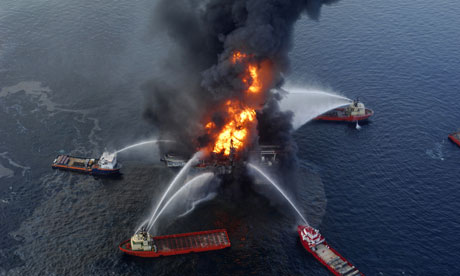Lets just get this straightened out.
Oil Type: API Gravity Sulfer content
Alaska North Slope: 31.9° 0.93%
Heavy Louisiana Sweet 32.9° 0.35%
Light Louisiana Sweet 35.6° 0.37%
South Louisiana Sweet 35.9° 0.33%
Light crude oil is defined as having an API gravity higher than 31.1 °API. (less than 870 kg/m3)
Sweet crude oil is a type of petroleum. Petroleum is considered "sweet" if it contains less than 0.5% sulfur...[
When the total sulfur level in the oil is > 0.5 % the oil is called "sour."
[ame=http://en.wikipedia.org/wiki/List_of_crude_oil_products]List of crude oil products - Wikipedia, the free encyclopedia[/ame]
[ame=http://en.wikipedia.org/wiki/API_gravity]API gravity - Wikipedia, the free encyclopedia[/ame]
[ame=http://en.wikipedia.org/wiki/Sweet_crude_oil]Sweet crude oil - Wikipedia, the free encyclopedia[/ame]
[ame=http://en.wikipedia.org/wiki/Sour_crude_oil]Sour crude oil - Wikipedia, the free encyclopedia[/ame]
According to this both the valdez and the deepwater horizon spill contained light crude oil. The valdez spill contained "sour" crude oil while the deepwater horizon conains "sweet" crude oil. Anything over 10 on the api scale floats so I'm assuming that the same problems here will apply.
Assuming the best case senerio, that the deepwater horizon spill is soley comprised of south louisiana sweet, using the equation:
it is reasonable to approximetaly assume there are 7.44 barrels per metric ton in the deepwater horizan spill and 7.26 barrels per metric ton in the exxon valdez spill. Perhaps this can better show the difference in the density of each oil.
The fact that this spill has a sweet crude may be significant though since a sour oil will tend to be more toxic since it may contain more hydrogen sulfide.
One thing I will point out, and something I have not read a lot about is the fact the this is an open pipe spilling rather than a ship spill. Despite the fact that this is sweet crude I gotta think that some nasty crap has to be coming out of that pipe (why do you think it blew up). I have not been around any drilling, but I have heard of things like bad gas that sometimes come out while drilling and this stuff will kill you in a heart beat.



